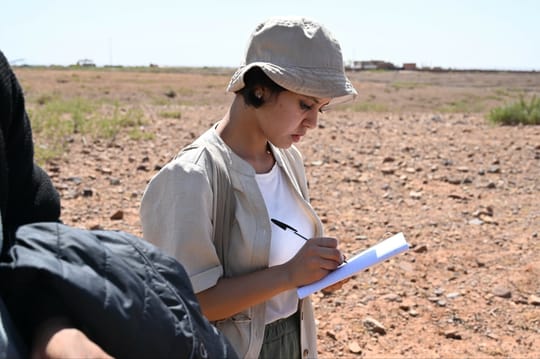Hanane Lahdar: The Power of a Dream

“Everyone can dream,” says Hanane Lahdar, 21-year old reporting officer for the tree planting program at the High Atlas Foundation in Marrakesh. HAF is a Moroccan NGO dedicated to sustainable development with initiatives focused on planting trees, psychosocial empowerment, cultural preservation, and earthquake relief. Her journey from rural village to working at HAF is a testament to resilience and determination. She holds the foundation's mission dear to her heart.
Hanane’s story begins in Ait Lhaj, a small rural village where it’s unexpected (and often discouraged) for girls to be properly educated. As they only have a primary school, merely attending middle school requires a 7 km commute. In addition to geographical limitations, girls face pressure to marry young, have children, and care for the household.
Like many others, Hanane’s older sisters were not allowed to continue beyond middle school. Hanane, however, “insisted that [she] finish [her] studies.” She was determined that nothing would stand in the way of her dreams.
With Hanane’s determination to forge her own path, she earned the support of her father. At age 13, she left home to attend a boarding school for middle and high school in another village called Tamanar, only seeing her family on the weekends. She credits this experience for building resilience and independence at a young age. Capitalizing on the opportunity many girls of her village were not afforded, she studied hard and set herself up to continue into college.
Like many men in the village, Hanane’s father worked on a fishing ship and was not in a financial position to support her college education, yet another barrier to achieving her dreams. Despite the odds, her persistence never faltered. Along with the support her father was able to provide, Hanane worked three jobs during her time at university to make do.
At Cadi Ayyad University in Marrakesh, Hanane studied English literature. With first-hand knowledge of its importance, her thesis focused on early marriage. Hanane’s mother married at the age of 15 and her sister at 20. They encouraged Hanane to stay steadfast in her dreams, knowing the importance of education. Many girls in her village get married at 16 or 17 believing that it’s the only option for their future.
Unfortunately, Hanane’s village is just a part of a large trend in early marriage patterns across Morocco. In 2018, the Ministry of Justice registered 25,514 cases of child marriage, a prevalance rate of 9 percent. In reality, this statistic likely underestimates the number of cases due to the majority of child marriages, especially rural ones, being carried out under customary Muslim law. These cases are required by Moroccan law to be recognized retroactively. (UNICEF)
In 2004, the Moroccan government introduced Moudawana, a family code intended to expand the rights of women. This law raised the minimum marriage age from 15 to 18 but left judges the discretion to grant exceptions to the rule. As a result, “between 2006 and 2018, approximately 32,000 requests for marriage to children were submitted each year, 85 percent of which were approved.” In 2019 alone, 27,623 requests were submitted with 99 percent of girls aged between 15 and 17 (UNICEF).
The main drivers of early marriage are poverty, gender inequality, social pressures, religious principles, and, like Ait Lhaj, lower levels of education. A 2019 study found “three-quarters of parents of children married before the age of 18 were illiterate or had not completed primary school. One-quarter of Moroccan girls with no education were married by age 18, compared with 7 percent of girls with secondary or further education” (UNICEF). In 2023, the Moroccan government began debating revisions of the Moudawana code to further address these issues.
Hanane graduated from Cadi Ayyad last summer, the first in her family to achieve this level of education. Moving forward, she dreams of joining HAF’s psychosocial empowerment team dedicated to helping women find their voice and passion. Hanane sees a young version of herself in the girls HAF works with and wishes to “help them realize they have other opportunities.”
As a result of her personal success, Hanane feels responsible to her providing her family and Moroccan girls with a brighter future. When asked to share a message to the world she responded “Everyone has the right to dream… we have to do something about it. Everyone can help.” Hanane is living proof of the power of dreams and recognizes how important words can be in empowering others.